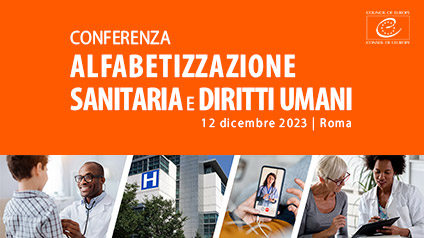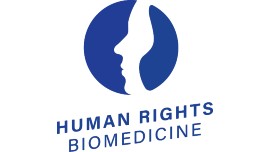Alfabetizzazione sanitaria e diritti umani
Per rafforzare la fiducia e l’accesso equo all'assistenza sanitaria

L'alfabetizzazione sanitaria contribuisce in modo fondamentale alla salvaguardia del principio dei diritti umani relativo all’accesso equo all'assistenza sanitaria, soprattutto quando le risorse sanitarie esistenti sono meno accessibili a determinate popolazioni a causa delle loro circostanze.
L'evento è organizzato dal Consiglio d'Europa in collaborazione con l'Ufficio Nazionale Antidiscriminazioni Razziali d'Italia e con il sostegno del Ministero della Famiglia, della Natalità e delle Pari Opportunità e del Ministero della Salute italiano.
What is health literacy and why is it important ?
Stephan Van den BROUCKE,
Professor of Health Psychology, Catholic University, Belgium
Why is the Council of Europe conference important for the National Office against Racial Discrimination of Italy?
Mattia PERADOTTO,
Director General, National Office Against Racial Discrimination (UNAR), Italy
What was the main outcome of the Council of Europe conference ?
Kristine SØRENSEN,
Global Health Literacy Academy, Denmark

 “We need strong health literacy skills so people can fully read and understand health information and make informed decisions, where needed. This is best achieved by health services using literacy friendly approaches such as using plain language.”
“We need strong health literacy skills so people can fully read and understand health information and make informed decisions, where needed. This is best achieved by health services using literacy friendly approaches such as using plain language.”
Helen RYAN, Health Lead in Adult Literacy for Life Programme Office, Department of Further and Higher Education, Research, Innovation and Science, Ireland

 “The Council of Europe Guide to health literacy fosters evidence-informed policy making and practice to support equitable access to health care. As an informative resource with actionable good practices, the Guide supports the responsiveness of health systems’ in adressing the needs of everyone seeking treatment and care.”
“The Council of Europe Guide to health literacy fosters evidence-informed policy making and practice to support equitable access to health care. As an informative resource with actionable good practices, the Guide supports the responsiveness of health systems’ in adressing the needs of everyone seeking treatment and care.”
Leena PAAKKARI, Associate professor, University of Jyväskylä, Finland

 "As telemedicine becomes more common, doctors need to rely more on patients to measure, for instance, their heart rates or body temperatures themselves, at home without a healthcare professional present. Patients understanding the importance of such data and how it relates to their disease is therefore increasingly more important, not only for their self care but also for doctors who keep track of patients remotely."
"As telemedicine becomes more common, doctors need to rely more on patients to measure, for instance, their heart rates or body temperatures themselves, at home without a healthcare professional present. Patients understanding the importance of such data and how it relates to their disease is therefore increasingly more important, not only for their self care but also for doctors who keep track of patients remotely."
Kristof VANFRAECHEM, Founder and CEO, Data for Patients, Spain










